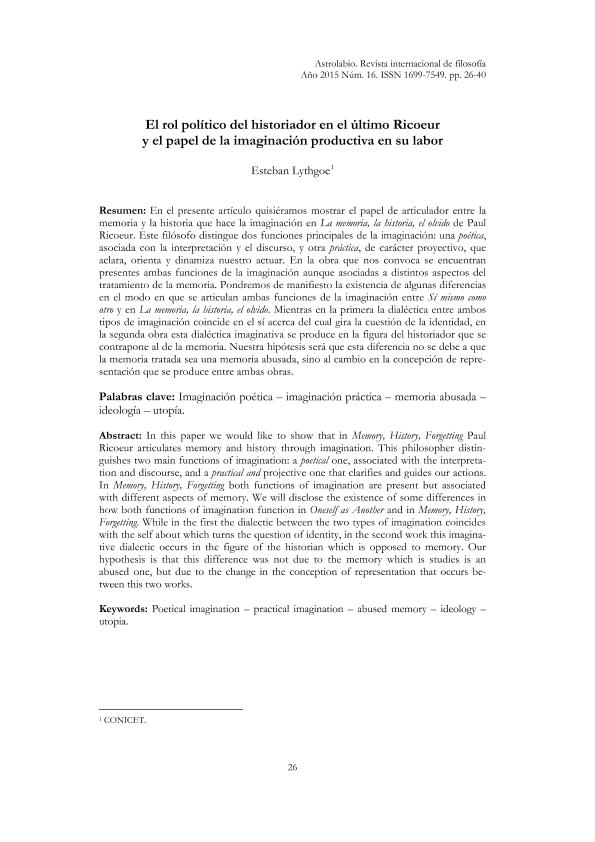Artículo
En el presente artículo quisiéramos mostrar el papel de articulador entre la memoria y la historia que hace la imaginación en La memoria, la historia, el olvido de Paul Ricoeur. Este filósofo distingue dos funciones principales de la imaginación: una poética, asociada con la interpretación y el discurso, y otra práctica, de carácter proyectivo, que aclara, orienta y dinamiza nuestro actuar. En la obra que nos convoca se encuentran presentes ambas funciones de la imaginación aunque asociadas a distintos aspectos del tratamiento de la memo-ria. Pondremos de manifiesto la existencia de algunas diferencias en el modo en que se articulan ambas funciones de la imaginación entre Sí mismo como otro y en La memoria, la historia, el olvido. Mientras en la primera la dialéctica entre ambos tipos de imaginación coincide en el sí acerca del cual gira la cuestión de la identidad, en la segunda obra esta dialéctica imaginativa se produce en la figura del historiador que se contrapone al de la memo-ria. Nuestra hipótesis será que esta diferencia no se debe a que la memoria tratada sea una memoria abusada, sino al cambio en la concepción de representación que se produce entre ambas obras. In this paper we would like to show that in Memory, History, Forgetting Paul Ricoeur articulates memory and history through imagination. This philosopher distinguishes two main functions of imagination: a poetical one, associated with the interpretation and discourse, and a practical and projective one that clarifies and guides our actions. In Memory, History, Forgetting both functions of imagination are present but associated with different aspects of memory. We will disclose the existence of some differences in how both functions of imagination function in Oneself as Another and in Memory, History, Forgetting. While in the first the dialectic between the two types of imagination coincides with the self about which turns the question of identity, in the second work this imaginative dialectic occurs in the figure of the historian which is opposed to memory. Our hypothesis is that this difference was not due to the memory which is studies is an abused one, but due to the change in the conception of representation that occurs between this two works.
El rol político del historiador en el último Ricoeur y el papel de la imaginación productiva en su labor
Fecha de publicación:
02/2015
Editorial:
Universidad de Barcelona
Revista:
Astrolabio
e-ISSN:
1699-7549
Idioma:
Español
Tipo de recurso:
Artículo publicado
Clasificación temática:
Resumen
Palabras clave:
Imaginación poética
,
imaginación práctica
,
memoria abusada
,
ideología
Archivos asociados
Licencia
Identificadores
Colecciones
Articulos(SEDE CENTRAL)
Articulos de SEDE CENTRAL
Articulos de SEDE CENTRAL
Citación
Lythgoe, Esteban; El rol político del historiador en el último Ricoeur y el papel de la imaginación productiva en su labor; Universidad de Barcelona; Astrolabio; 16; 2-2015; 26-40
Compartir




